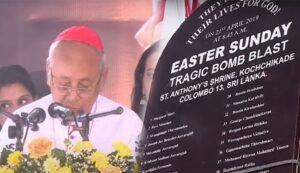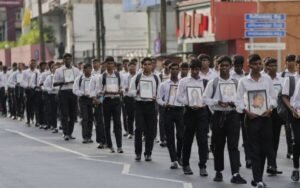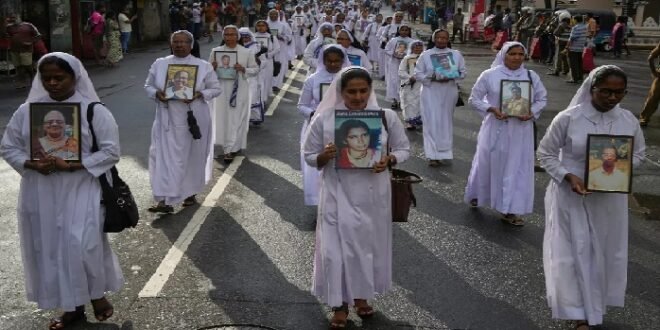23-04-2025
VATICAN CITY/ COLOMBO: The Vatican has recognized 167 Sri Lankan Catholics killed in the 2019 Easter Sunday bombings as ‘witnesses of faith’, six years after the attacks that killed over 260 people.
The Catholic Church in Sri Lanka has said that the Vatican has recognized 167 of its members killed in the 2019 Easter Sunday suicide bombings as witnesses of faith, a designation given to individuals who die for their religious beliefs.
 The attack was carried out by suicide bombers influenced by the Islamic State.
The attack was carried out by suicide bombers influenced by the Islamic State.
The announcement was made during a vigil at St. Anthony’s Church in Colombo, one of the sites attacked in the coordinated bombings.
The vigil, attended by hundreds of people including religious leaders from Buddhist, Hindu, Muslim and Christian communities, marked the sixth anniversary of the deadly attacks that left more than 260 people dead, including 42 foreign nationals.
Cardinal Malcolm Ranjith, the Archbishop of Colombo, told attendees that Cardinal Marcello Semeraro, head of the Vatican’s Dicastery for the Causes of Saints, had added the names of the 167 Catholic victims to its official register.
The Vatican acknowledged the victims for having died “due to violent opposition to their faith motivated by odium fidei hatred of the faith.”
They have been entered “in the catalogue of the witnesses of the faith in its order book, considering the context of their heroism,” Ranjith said. He added that seven victims of other faiths were also “respectfully remembered.”
The designation comes under a new category established by Pope Francis in 2023 for individuals killed while professing their Catholic faith.
The Vatican created a special commission to document such cases, placing them alongside officially recognized martyrs who may one day be candidates for beatification or sainthood.
On 21 April 2019, Islamic State-inspired militants from the local extremist group National Thowheed Jamath carried out near-simultaneous suicide bombings at three churches St. Anthony’s in Colombo, St. Sebastian’s in Negombo and Zion Church in Batticaloa as well as three hotels in the capital.
 The Catholic Church has continued to demand a full investigation into the attacks.
The Catholic Church has continued to demand a full investigation into the attacks.
This includes renewed calls for transparency after a documentary last year aired an interview with a man claiming to have arranged a meeting between National Thowheed Jamath and a senior state intelligence official.
The meeting allegedly involved plotting the attacks to instil fear and instability, ultimately benefiting then-presidential candidate Gotabaya Rajapaksa.
Presidential elections held soon after the attacks saw Gotabaya Rajapaksa sweep to power, after campaigning on a national security platform.
He made a statement in parliament denying all the allegations raised in the documentary. The issue gained new currency when Sri Lanka elected a new president and parliament in 2024. The newly-elected government has since alleged that the attacks were a conspiracy by a “certain group” to seize political power at the time.
They have also reopened investigations into the attacks, with a report of a presidential inquiry commission officially handed over to the country’s central investigative agency for further inquiry.
“As a government, we reaffirm our commitment to ensuring that justice is served. Ongoing efforts to investigate the attacks and uncover all truths without obstruction or delay remain a top priority. Accountability, transparency, and genuine justice are essential to honoring the memory of the victims and restoring public trust,” Prime Minister Harini Amarasuriya said in a statement to mark the anniversary. (Int’l Monitoring Desk)
 Pressmediaofindia
Pressmediaofindia




